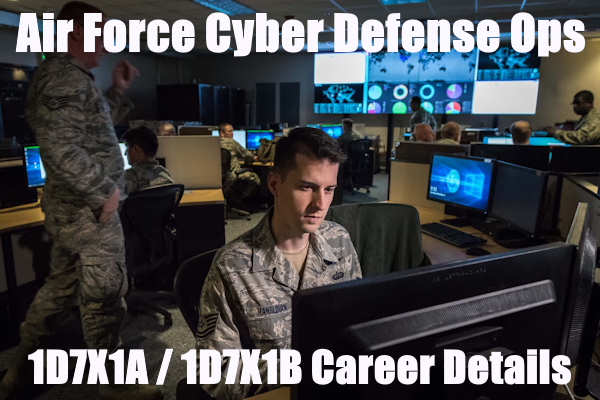Air Force Cyber Defense Operations (1D7X1) is an exciting new career path within the service branch.
Recently, the United States Air Force (USAF) adapted their guidelines to merge several existing military specialties into one new career.
As a result, new recruits, along with existing personnel, may want to consider a rewarding new career in cyberspace support.
Learn more about what it takes to join Air Force Cyber Defense Operations (1D7X1), below.
Related Article – Air Force Cyber Systems Operations (3D0X2): Career Profile
Table of Contents
Air Force Cyber Defense Operations
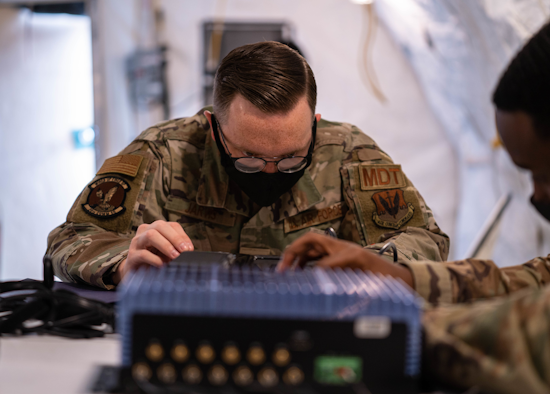
The United States Air Force (USAF) recently revised some of its military career paths, including those in cybersecurity.
Consequently, more than 43,000 enlisted personnel were converted from former communications career fields into the new cyberspace support specialty – 1D7X1.
The service branch utilizes Air Force Speciality Codes (AFSCs) to categorize the different career paths in military service.
So, 1D7X1 is the new designation for the cyber defense unit known as Air Force Cyber Defense Operations.
Accordingly, under 1D7X1, several new military occupations exist that are ready to challenge new Air Force recruits in cyberspace support.
The new U.S. Air Force specialty merges several communications and computer-based AFSCs under a new operational category.
Therefore, Air Force 1D7X1 combines several different specialties into one broad category to define cyber defense and cyberspace support.
Air Force 1D7X1 offers many exciting opportunities to pursue the latest and greatest in cyberspace warfare.
Adapting to a Changing, Highly-Advanced Technological World
The U.S. Air Force confirms that the recent conversion of many AFSCs arises from the need to adapt to a changing society.
In fact, the AFSC conversions have been a multi-year effort to adjust to the increasing computerization of weapon systems.
Of course, modern weaponization presents many advantages, one of which is not being vulnerable to cyber attacks.
As such, the Air Force established Cyber Defense Operations (1D7X1) in order to combat the latest in technology.
Air Force 1D7X1 personnel serve as mission defense teams charged with identifying where the cyber vulnerabilities are for each weapon system.
Moreover, Cyber Defense Operations specialists develop safeguards to keep those weapon systems protected from enemy attacks.
Consequently, these service members will be at the forefront of keeping the nation safe in the forthcoming years.
Cyber support enables the United States Air Force to defend and respond to cyber-attacks.
Related Article – Cyberspace Operations Officer: Pay, Training, And More
Air Force Cyber Defense Operations (1D7X1) Requirements
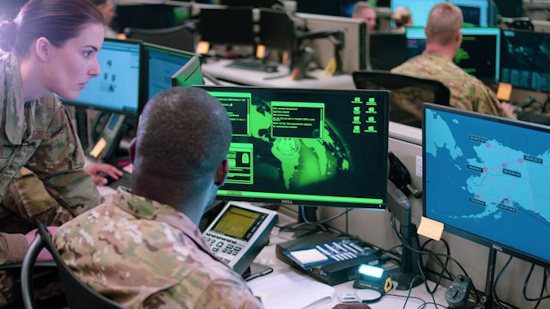
Recruits considering entering Cyber Defense Operations (1D7X1) in the USAF will find the requirements include a high school diploma or GED.
Normal color vision and hearing are also required.
Because airmen in this field will have access to sensitive information, they’ll need to be U.S. citizens and eligible for Top-Secret Clearance.
Minimum ASVAB scores required for acceptance include good scores in the Electronic Data Processing Test (EDPT), Electrical, Cyber, and General subtests.
- Electrical: 55 and
- EDPT: 57 and
- Cyber: 60
OR
- General: 64 and
- EDPT: 57
OR
- General: 54 and
- Cyber: 60 and
- EDPT: 57
OR
- Electrical: 60 and
- EDPT: 57
Air Force 1D7X1 Qualifications & Training
The continuously evolving field of cyberspace requires a unique set of skills to succeed.
The new Tech School for Cyber Defense Operations opened in late 2021 at Keesler AFB, MS, and lasts for 66 days.
The field’s Career Field Education and Training Plan (CFETP) was finalized in July 2023.
1D7X1 Shreds
Each Airman assigned to AFSC 1D7X1 also receives a “shred,” an alphabetic character that indicates their specialty in Cyber Defense.
- 1D7X1 Cyber Defense Ops
- 1D7X1A Network Systems Ops
- 1D7X1B Systems Ops
- 1D7X1D Security Ops
- 1D7X1E Client Systems Ops
- 1D7X1K Knowledge Ops
- 1D7X1R RF Trans Ops
- 1D7X3C Cable and Antenna Ops
- 1FD7X2F Spectrum Ops
- 1D7X1M Msn Def Activities
- 1D7X1P Data Ops
- 1D7X1Q Enterprise Ops
- 1D7X1W XCOMM
Career Progression
The Air Force Field Education and Training Plan (CFETP) outlines the proposed stages of progression toward becoming 1D7X1:
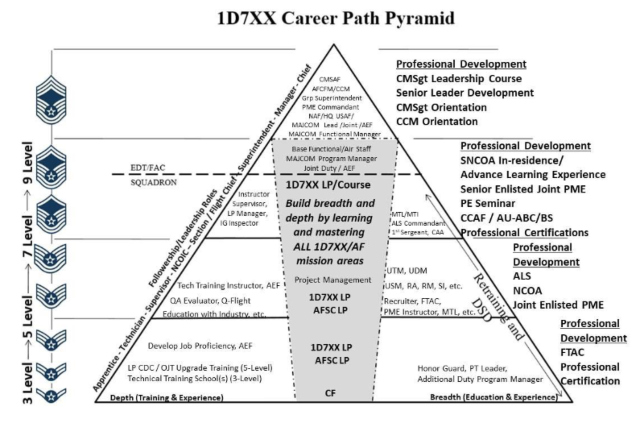
The purpose of the CFETP is to identify the necessary requirements and qualifications of each AFSC.
Currently, the CFETP plans to divide training programs based on the “level” of the cyber support specialist.
Accordingly, the 4 levels of training currently planned for Air Force 1D7X1 are similar to all enlisted training programs and include:
- Apprentice – Level 3
- Journeyman – Level 5
- Craftsman – Level 7
- Senior Enlisted Leader – Level 9
Therefore, the type and difficulty of training will largely vary depending on the level achieved by the airmen.
Regardless, the hands-on training is designed to apply directly to the specific duty position.
Related Article – Air Force Cyber Warfare (1B4X1): Career Details
Air Force 1D7X1 Job Details
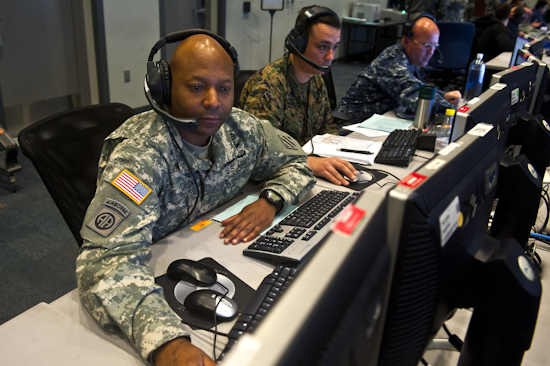
While the classification of Cyber Security and Cyber Surety AFSCs has changed from Support to Operational, this primarily changes the priority the USAF puts on the career field.
The Cyber Defense Operations AFSC is now considered a critical part of operations, and job tasks in this field will encompass active campaigns as well as providing defensive cybersecurity for computer databases and systems.
In many ways, this AFSC is still being defined, and as a result, details remain limited on what precisely defines the role of Air Force Cyber Defense Operations specialist (1D7X1).
The need for advanced cyber security has become more critical when it comes to defending advanced weapon systems, such as the E-3 Sentry and F-22 Raptor.
As such, Air Force 1D7X1 plans to play a significant role in future defense operations.
Air Force 1D7X1 is closely associated with the former Air Force specialty Cyber Systems Operations (3DXXX).
In the past, Cyber Systems Operations was responsible for designing, installing, and supporting defense systems.
So, it’s anticipated that 1D7X1 will inherit many of these responsibilities and more in the future.
For this reason, expect Air Force 1D7X1 to continue and serve at the forefront of identifying and defending against vulnerabilities in cyberspace.
Related Article – Marine Corps Cyber Network Operator (MOS 0651)
Air Force 1D7X1 Pay & Benefits
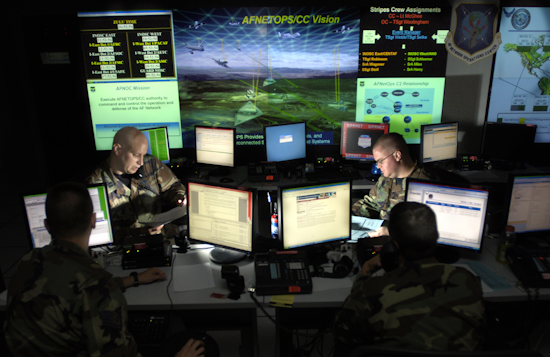
The United States Air Force offers the same pay rate regardless of the military specialty.
Therefore, those who serve in cyber operations are paid the same base salary as those with the same rank and years of service in another military specialty.
Below is an example of monthly base pay for enlisted Airmen in 2023.
| Insignia | Pay Grade | Rank | Abbreviation | 2023 Minimum Monthly Pay |
|---|---|---|---|---|
| E-1 +4 months | Airman Basic | AB | $1,917.60 | |
| E-2 | Airman | Amn | $2,149.20 | |
| E-3 | Airman First Class | A1C | $2,259.90 | |
| E-4 | Senior Airman | SrA | $2,503.50 | |
| E-5 | Staff Sergeant | SSgt | $2,730.30 | |
| E-6 | Technical Sergeant | TSgt | $2,980.50 | |
| E-7 | Master Sergeant | MSgt | $3,445.80 | |
| E-8 | Senior Master Sergeant | SMSgt | $4,957.20 | |
| E-9 | Chief Master Sergeant | CMSgt | $6,055.50 | |
| E-9 | Command Chief Master Sergeant | CCM | $6,055.50 | |
| E-9 | Chief Master Sergeant Of The Air Force | CMSAF | $6,055.50 |
The numbers above are minimum base pay and don’t include allowances for housing (BAH), food (BAS), or uniforms.
Enlistment into the USAF includes free housing and meals for those living on base, and generous allowances for those authorized to live off base.
Additionally, the U.S. Air Force provides an excellent benefits package for service members and their dependents.
It includes health and dental coverage, 30 days paid vacation a year, tuition assistance and college funding, access to tax-free exchange and commissary shopping, as well as an excellent retirement package after 20 years.
Related Article – Air Force Cyber Transport Systems (3D1X2): Career Profile
Cyber Support Civilian Job Opportunities
It’s a smart move to consider a future career in cyber security or support.
Why?
Cyber support jobs are not only becoming increasingly in demand for military service but civilian employment as well.
In fact, estimates predict that cybersecurity jobs will rise by 33% between 2020 and 2030.
Worldwide, that equals approximately 3.5 million new job openings within the timeframe an Airman would leave service after one tour.
Currently, the mean salary for Information Security Analysts is $119,860, according to the U.S. Bureau of Labor Statistics.
For this reason, getting into cyber security is a really good investment for the future.
The job demand is both high in the military as well as in the private sector and is highly unlikely to change in the near future.
Conclusion
The United States Air Force is changing some of its newest military occupations to reflect the changing needs of society and warfare.
Accordingly, the new position 1D7X1 is in great demand.
It’s an excellent opportunity to join the U.S. Air Force and help defend the nation as a Cyber Defense Operations specialist.
Air Force Cyber Defense Operations (1D7X1) play a pivotal role in future defense operations.
The threat of cyber warfare never ceases, which makes the need for 1D7X1 so vital.
Featured Image Source – www.Defense.gov
- Ikon Pass Military Discount: Learn How To Save Big - January 31, 2025
- RTIC Military Discount: Find Out How To Save Big on Gear - January 30, 2025
- Traeger Military Discount: Learn How To Save Big on Smokers - January 28, 2025

